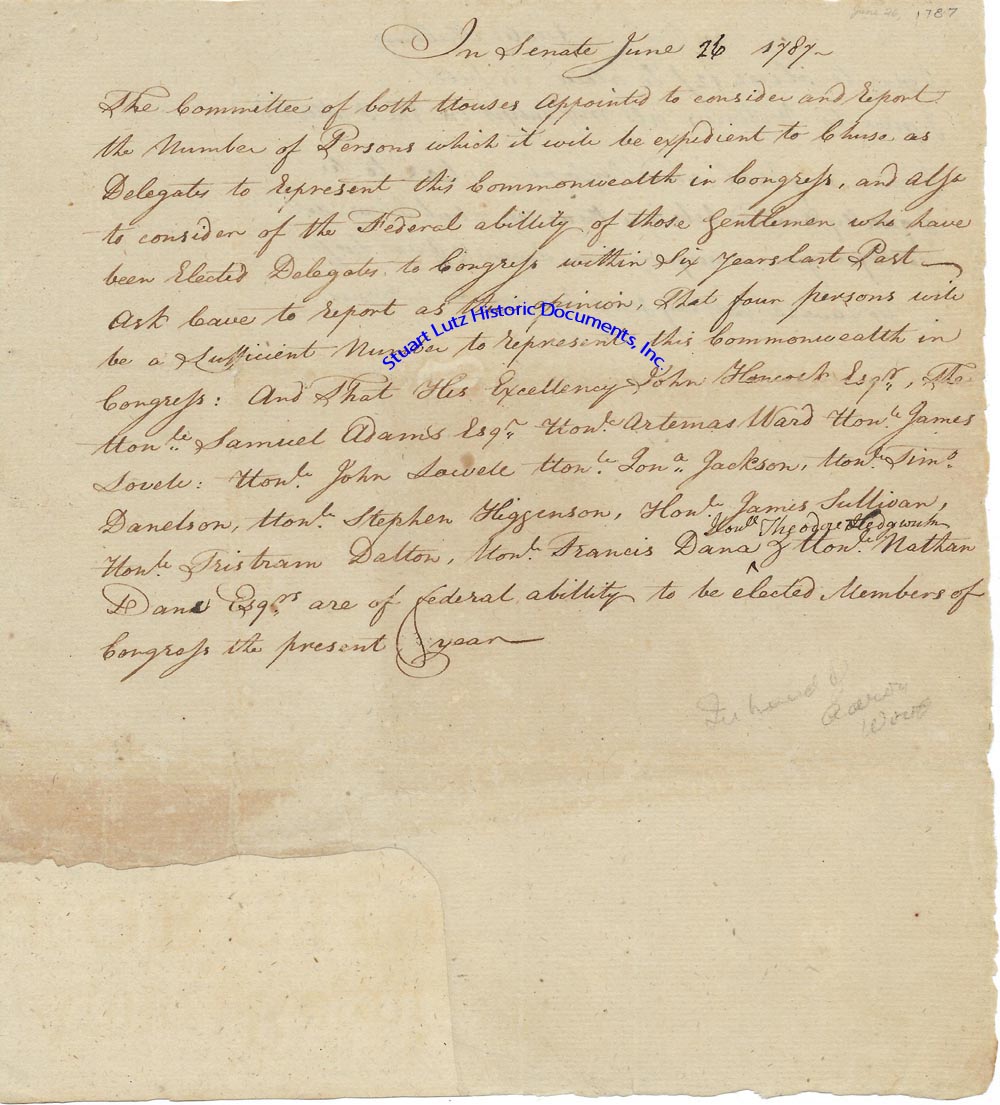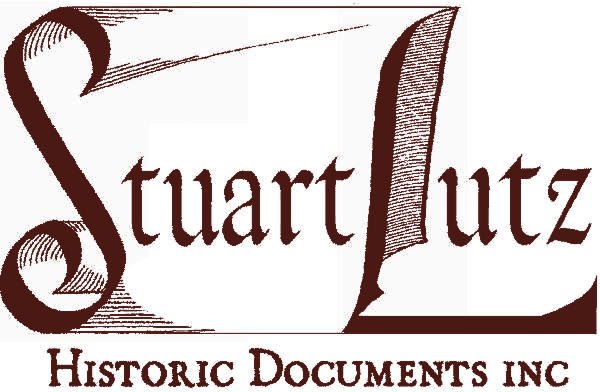| |
 JAMES WILSON JAMES WILSON |
|
|
|
|
| |
Price: $400.00 |
Stock# 6195 |
| |
1779 FINANCIAL JUDGEMENT SIGNED BY JAMES WILSON, SIGNER OF THE DECLARATION OF INDEPENDENCE AND UNITED STATES CONSTITUTION
JAMES WILSON (1742-1798). Wilson was one of only six people to sign both the Declaration of Independence and the Constitution, and he was an original Associate Justice on the Supreme Court.
DS. 1 pg. 6” x 12”. July 23, 1779. Cumberland County. A partly printed legal document signed “Wilson Junr” on the back. The front of the document states: “George the Third, by the Grace of GOD, of Great-Britain, France and Ireland, King, Defender of the Faith, &c. To the Sheriff of Cumberland County, GREETING: We command you, that of the Goods and Chattels, Lands and Tenements of Hugh Cook late of your County yeoman in your Bailiwick, you cause to be made, as well the Sum of Forty five pounds Lawful money of Pennsylvania which James Irwin…of Robert Callender lately in our County Court of Common Pleas, before our Justices at Carlisle, recovered against him of debt as Twenty one shillings and ten pence which the said James in our same Court were adjudged to his damages, which he sustained by Occasion of the Detention of that Debt, whereof the said Hughes convict…”. The witness is listed as “John Amstrong”, and the front is then signed “John Agnew”. John Agnew, a Carlisle merchant, signed in his capacity as Cumberland County Clerk of the Court of Quarter Sessions. John Amstrong (1717-1795) was a logical choice to serve as a witness, for he was then serving as a brigadier general in the Continental Army and as a major general in the Pennsylvania Militia, and later served as a delegate to the Continental Congress for Pennsylvania. The parties in the case were all prominent Pennsylvania men. Hugh Cooke was a wealthy landowner who passed away in 1765. His will seems to be the cause of this legal dispute. Colonel Robert Callender (1726-1776) was a Revolutionary War soldier, Indian trader, and wealthy landowner and James Irwin (1758-1847) was a fellow soldier. Most likely, Irwin was representing the interests of the recently deceased Callendar in this litigation. The back, all handwritten, notes the following: “No. 101 April Term 1776 James Irwin…of Robert Callendar V .Hugh Cook levied on the defendant Horses…& Land subject of Prior Executions”. It lists various fees that total the previously mentioned twenty-one shillings and ten pence, and then signed in another hand by “Wilson, Junr”. James Wilson signed this document in no official capacity, but as a successful Pennsylvania lawyer probably representing one of the parties. The document is in excellent condition with a central fold. |
6195

|
|
| |
| |
 OLIVER WOLCOTT OLIVER WOLCOTT |
|
|
|
|
| |
Price: $100.00 |
Stock# 5894 |
| |
OLIVER WOLCOTT, JR., AS AUDITOR OF THE TREASURY DEPARTMENT, CLARIFIES CUSTOMS COLLECTION LAW
OLIVER WOLCOTT, JR. (1760-1833). Wolcott served as the second Secretary of the Treasury from 1795 to 1800, as a Judge of the United States Circuit Court for the Second Circuit from 1801 to 1802, and as Governor of Connecticut from 1817 to 1827.
DS. 1 pg. 8” x 10”. March 22, 1793. Treasury Department, Comptroller’s Office. A document signed by “Oliv. Wolcott” to “Jonathan Fitch Esq.” in the form of a typed circular: “Sir, the thirty-fourth section of the Collection Law provides that certain rates per cent, shall be allowed for the tares of Coffee, Pepper and Sugar other than Loaf Sugar. – Upon this provision a doubt has existed whether the per centage ought not in certain cases, to be computed upon the Cwt. or one hundred and twelve pounds; or ought in all cases to be computed upon the 100 lb. or short hundred. – The practice at different Ports has on this point been, and continues to be dissimilar. – It is necessary to produce uniformity. As the subject is not free from ambiguity, a Legislative explanation would have been preferred to a construction of the Law, from the Treasury; but as none has taken place, the Secretary of the Treasury has directed me to inform you that in the future the percentage is in all cases to be computed on the 100 lb. or short hundred – in a doubtful case this construction is preferred, as being most accommodating to the Merchant…” This letter is an excellent example of early American bureaucratic lawmaking, revealing that executive agencies, rather than Congress, have long been stepping in to crafting legislation. In this case, in an era when government revenue predominantly came from ports and import and export proceeds, the Secretary of the Treasury needed to clarify federal legislation on such levies. The typed circular is in fine condition with light marginal chipping. |
5894

|
|
| |
| |
 (AARON WOOD) (AARON WOOD) |
|
|
|
|
| |
Price: $750.00 |
Stock# 4975 |
| |
DURING THE CONSTITUTIONAL CONVENTION, MASSACHUSETTS LISTS MEN WHO COULD “REPRESENT THE COMMONWEALTH IN CONGRESS”; THE PRESTIGIOUS LISTS INCLUDES JOHN HANCOCK AND SAMUEL ADAMS
AARON WOOD (1720-1791). Wood was a Massachusetts elected official, serving in the state House of Representatives and the General Court.
AD. 1pg. 8 ¼” x 9”. June 26, 1787. In Senate [likely Boston]. An autograph manuscript in the handwriting of Massachusetts politician Aaron Wood. Written during the Constitutional Convention, the state was considering who they could send to the new Federal Congress. Wood wrote: “The Committee of both Houses Appointed to consider and report the Number of Persons which it will be expedient to Chuse [sic] as Delegates to represent the Commonwealth in Congress, and also to consider the Federal ability of those Gentlemen who have been Elected Delegates to Congress within Six Years last Past – Ask have to report as their opinion, That four persons will be a sufficient number to represent this Commonwealth in Congress: And that his Excellency John Hancock Esqr, The Honble Samuel Adams Esqr, Honl Artemas Ward, Honl James Lovell, Honl John Lovell, Honl Jona Jackson, Honl Timo Danelson, Honl Stephen Higgenshon, Honl James Sullivan, Honl Tristam Dalton, Honl Francis Dana, Honl Theodore Sedgwick, Honl Nathan Dana Esqrs are of federal ability to be elected Members of Congress the present year.” The four Massachusetts representatives to the Constitutional Convention were Elbridge Gerry, Nathaniel Gorham, Rufus King and Caleb Strong. The first two Massachusetts Senators, first elected in 1788, were Tristam Dalton (mentioned in the document) and George Cabot. The first eight Massachusetts Congressmen were Fisher Ames, Elbridge Gerry, Benjamin Goodhue, Jonathan Grout, George Leonard, George Partridge, Theodore Sedgwick (mentioned in the document) and George Thatcher. The document is missing the lower left corner but it has been professionally repaired. An interesting foundational document. |
4975

|
|
| |
| |
<Previous 6>
|
 |



